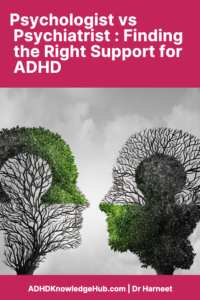Psychologist vs Psychiatrist : Finding the Right Support for ADHD
As someone deeply invested in finding effective solutions for those grappling with Attention Deficit Hyperactivity Disorder (ADHD), I understand the complexities involved in navigating the realm of mental health care. In this article, I aim to shed light on the roles of Psychologist vs Psychiatrist in managing ADHD, offering valuable insights to aid individuals in making informed decisions about their treatment journey.
Understanding Psychologist vs Psychiatrist Roles
Before delving into the specifics of ADHD treatment, it’s crucial to grasp the distinct roles of psychologists and psychiatrists. Both professionals play pivotal roles in mental health care, yet their approaches and methodologies differ significantly.
Psychologists are experts in human behavior and mental processes, holding advanced degrees in psychology. They utilize various therapeutic techniques to help individuals understand and manage their emotions, thoughts, and behaviors. Psychologists often employ talk therapy, cognitive-behavioral therapy (CBT), and other evidence-based interventions to address psychological issues, including ADHD.
On the other hand, psychiatrists are medical doctors who specialize in diagnosing and treating mental illnesses. They are licensed to prescribe medication and may incorporate pharmacological interventions alongside therapy to manage psychiatric conditions like ADHD.
Psychologist vs Psychiatrist : Similarities and Differences
While psychologists and psychiatrists share a common goal of improving mental well-being, their paths diverge in terms of education, training, and treatment approaches.
Psychologists typically earn a doctoral degree in psychology (Ph.D. or Psy.D.), which involves extensive coursework, supervised clinical training, and research. In contrast, psychiatrists complete medical school followed by residency training in psychiatry, equipping them with a comprehensive understanding of both psychological and biological aspects of mental health.
When it comes to treating ADHD, psychologists often focus on psychotherapy techniques aimed at enhancing self-awareness, developing coping strategies, and improving executive functioning skills. In contrast, psychiatrists may prescribe medication, such as stimulants or non-stimulants, to manage ADHD symptoms effectively.
Why Consult a Psychologist for ADHD?
Seeking assistance from a psychologist for ADHD offers numerous advantages. Psychologists employ a range of therapeutic modalities tailored to the individual needs of their clients, fostering a supportive environment for self-exploration and growth. Through techniques like CBT, behavioral therapy, and mindfulness practices, psychologists empower individuals to address underlying issues contributing to ADHD symptoms and develop practical strategies for managing impulsivity, inattention, and hyperactivity.
Moreover, therapy sessions with a psychologist provide a safe space for individuals to express their concerns, learn effective communication skills, and cultivate resilience in coping with everyday challenges. By working collaboratively with a psychologist, individuals with ADHD can gain valuable insights into their strengths and weaknesses, paving the way for meaningful personal growth and development.
Why Consult a Psychiatrist for ADHD?
In certain cases, consulting a psychiatrist for ADHD may be warranted, particularly when medication management is deemed necessary. Psychiatrists possess specialized knowledge in psychopharmacology and can prescribe medications to alleviate ADHD symptoms, such as stimulants (e.g., Adderall, Ritalin) or non-stimulants (e.g., Strattera, Intuniv).
Additionally, psychiatrists conduct comprehensive psychiatric evaluations to assess for co-occurring conditions or underlying medical issues that may exacerbate ADHD symptoms. By conducting thorough assessments and monitoring medication responses, psychiatrists play a crucial role in optimizing treatment outcomes and improving overall functioning in individuals with ADHD.
Choosing the Right Professional
Psychologist vs Psychiatrist – ADHD treatment can be challenging, but several factors can inform this decision. Individuals should consider their specific needs, preferences, and treatment goals when selecting a mental health professional. For those seeking non-pharmacological interventions and focused on introspection and self-improvement, a psychologist may be the preferred choice. Conversely, individuals requiring medication management or facing complex psychiatric issues may benefit from the expertise of a psychiatrist.
Ultimately, the most effective approach to ADHD treatment often involves a multidisciplinary approach, combining therapy, medication, lifestyle modifications, and support from family and peers. By collaborating with a team of skilled professionals, individuals with ADHD can receive comprehensive care tailored to their unique needs, promoting holistic well-being and long-term success.
Combining Therapy and Medication – Psychologist vs Psychiatrist
In many cases, integrating therapy and medication yields the best results in managing ADHD symptoms. While medication can help alleviate immediate symptoms, therapy equips individuals with essential skills and coping strategies to navigate challenges effectively in the long term. By addressing underlying emotional and behavioral patterns through therapy, individuals can enhance medication effectiveness, reduce reliance on medication, and foster sustainable improvements in functioning and quality of life.
Personal Experience and Success Stories
Throughout my journey in advocating for ADHD awareness and support, I’ve encountered numerous individuals who have found success in managing their symptoms with the help of psychologists and psychiatrists. From learning practical organizational strategies to overcoming self-doubt and stigma, these individuals have demonstrated resilience and determination in reclaiming control over their lives. Their stories serve as a testament to the transformative power of seeking professional help and embracing a proactive approach to mental health care.
Tips for Finding the Right Professional – Psychologist vs Psychiatrist
Finding the right psychologist or psychiatrist specializing in ADHD can be daunting, but several strategies can simplify the process. Start by seeking recommendations from trusted sources, such as healthcare providers, friends, or online support communities. Conduct thorough research to evaluate the credentials, experience, and treatment approaches of potential professionals. Don’t hesitate to schedule initial consultations to assess rapport and compatibility before committing to long-term therapy or medication management. Remember that finding the right fit is essential for building a trusting therapeutic relationship and maximizing treatment outcomes.
Myths and Misconceptions
Unfortunately, misconceptions about ADHD abound, perpetuating stigma and hindering access to appropriate care. It’s crucial to debunk common myths surrounding ADHD treatment to promote accurate understanding and compassionate support for individuals with ADHD. Some prevalent misconceptions include in the debate of:
- ADHD is just a phase: Contrary to popular belief, ADHD is a neurodevelopmental disorder that persists into adulthood for many individuals. Ignoring or dismissing ADHD symptoms can have serious consequences for academic, occupational, and social functioning.
- Medication is the only solution: While medication can be a valuable tool in managing ADHD symptoms, it’s not the only treatment option available. Therapy, lifestyle modifications, and behavioral interventions can also play significant roles in symptom management and skill-building.
- ADHD is a sign of laziness or lack of intelligence: ADHD is a legitimate medical condition rooted in neurobiological differences, not a character flaw or moral failing. Individuals with ADHD often possess unique strengths and talents alongside their challenges, and with the right support, they can thrive in various domains of life.
By dispelling these myths and fostering accurate understanding, we can create a more inclusive and supportive environment for individuals living with ADHD, and end the debate on Psychologist vs Psychiatrist, as both work hand in hand to ensure patient well being.
Stigma Surrounding Mental Health
Despite growing awareness of mental health issues, stigma remains a significant barrier to seeking help for conditions like ADHD. Many individuals hesitate to disclose their struggles or pursue treatment due to fear of judgment, discrimination, or misunderstanding. As advocates for mental health, it’s essential to challenge stigma by promoting open dialogue, empathy, and acceptance. By sharing personal experiences, educating others, and advocating for accessible mental health services, we can break down barriers and create a more supportive and compassionate society for everyone. Psychologist vs Psychiatrist.
Self-Care Strategies for ADHD
In addition to professional treatment, self-care plays a crucial role in managing ADHD symptoms and enhancing overall well-being. Incorporating the following self-care strategies into daily life can help individuals with ADHD thrive:
- Establishing routines: Creating structured routines and schedules can help individuals with ADHD stay organized and focused. Set aside specific times for tasks, breaks, and leisure activities to promote productivity and reduce overwhelm.
- Prioritizing sleep: Adequate sleep is essential for cognitive functioning and emotional regulation, both of which can be affected by ADHD. Aim for consistent sleep patterns and create a conducive sleep environment to support restful sleep.
- Engaging in physical activity: Regular exercise has been shown to improve attention, mood, and executive functioning in individuals with ADHD. Incorporate activities you enjoy, such as walking, jogging, dancing, or yoga, into your daily routine to reap the benefits of physical movement.
- Practicing mindfulness: Mindfulness techniques, such as deep breathing, meditation, and progressive muscle relaxation, can help individuals with ADHD cultivate present-moment awareness and reduce stress. Carve out time each day for mindfulness practice to promote calmness and mental clarity.
- Seeking social support: Surround yourself with understanding friends, family members, or support groups who can offer encouragement, validation, and practical assistance. Connecting with others who share similar experiences can reduce feelings of isolation and provide valuable insights and coping strategies.
Support Networks and Resources
Finding support networks and accessing reliable resources is instrumental in navigating the challenges of ADHD. Whether seeking peer support, educational materials, or professional guidance, numerous resources are available to individuals and families affected by ADHD. Some valuable resources include:
- ADHD support groups: Joining local or online support groups can provide a sense of community, validation, and practical advice from individuals who understand firsthand the challenges of living with ADHD.
- Educational websites: Websites such as CHADD (Children and Adults with Attention-Deficit/Hyperactivity Disorder) and ADDitude offer comprehensive information, articles, and tools for understanding and managing ADHD.
- Books and publications: Explore a wide range of books, articles, and academic journals dedicated to ADHD research, treatment, and personal narratives. Reading about others’ experiences and expert insights can deepen understanding and inspire proactive steps towards self-improvement.
Conclusion – Psychologist vs Psychiatrist
In conclusion, navigating the complexities of ADHD treatment requires careful consideration of various factors, including the roles of psychologists and psychiatrists. Whether seeking therapy, medication management, or a combination of both, individuals with ADHD can benefit from the expertise and support of qualified professionals. By prioritizing self-care, challenging stigma, and accessing support networks and resources, individuals can take proactive steps towards managing their ADHD effectively and living fulfilling lives.
Frequently Asked Questions (FAQs) – Psychologist vs Psychiatrist
- Is ADHD a lifelong condition?
- Yes, ADHD is a neurodevelopmental disorder that often persists into adulthood, although symptoms may change over time.
- Can adults be diagnosed with ADHD?
- Yes, ADHD can be diagnosed in adults based on symptoms that have persisted since childhood and significantly impact daily functioning.
- Are there alternative treatments for ADHD besides medication?
- Yes, alternative treatments for ADHD include therapy, lifestyle modifications, behavioral interventions, dietary changes, and neurofeedback, among others.
- How can I find affordable mental health care for ADHD treatment?
- Some options for affordable mental health care include community clinics, sliding-scale fee services, teletherapy platforms, and online support groups.
- What should I do if I suspect that I or someone I know has ADHD?
- If you suspect ADHD, it’s essential to seek evaluation and diagnosis from a qualified mental health professional, such as a Psychologist vs Psychiatrist, who specializes in ADHD assessment and treatment.

*We may earn a commission for purchases made using our links. Please see our disclosure to learn more.




